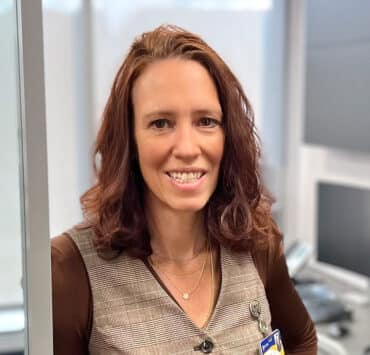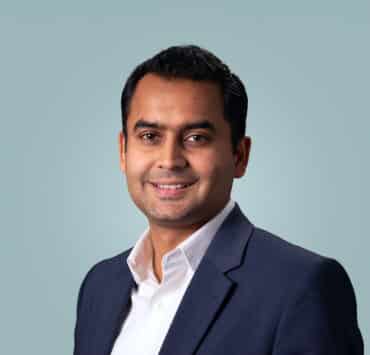Tom Bartiromo has seen it before. The story arc goes something like this: a healthcare organization is doing okay and maybe even thriving until a transformative event happens forcing it to climb out of a hole. That’s where he comes in. With more than twenty-eight years in healthcare IT in the provider, consulting, nonprofit, and for-profit sectors, Bartiromo understands what it takes for an organization to turn things around. To him, every crisis is an opportunity to rally toward a better future.
“When things are good, it’s easy to get lost in the noise. However, crisis has a way of revealing priorities and creates the conditions for transformative change,” Bartiromo says. “That can be really uplifting for staff and teams. It’s exciting to believe that you can climb out of the hole. Who doesn’t love a good underdog story?”
In 2022, Bartiromo came to Tower Health, a regional integrated healthcare system that serves communities in the Pennsylvania Berks, Chester, Montgomery, and Philadelphia counties, to conduct the third turnaround of his career. The system, which has more than 11,000 team members, faced difficult conditions coming out of the pandemic and went from rapid growth to requiring divestitures in a short amount of time.
“I surround myself with people who have experience in things we talk about and who can explain it really well, and then, I encourage professional disagreement in those areas.”
Tom Bartiromo
As senior vice president and chief information officer, Bartiromo has helped the organization fortify its IT infrastructure—work that isn’t flashy but is vital for a company in turnaround mode.
“As much as we want to be more innovative, we can’t afford to be distracted with shiny things at this time,” he says. “We need to be relentless in our focus on the turnaround in order to rebuild and invest more. It’s okay that we can’t be first mover status on the innovation front. It’s better to let others absorb the opportunity costs [and to] learn from that and adopt those things when we’re ready. If we’re intentional in that, everything else will follow.”
Financial and capital constraints haven’t stopped him and his team from finding creative ways to get the IT resources the organization needs. In fact, the constraints have improved how they frame the business case for targeted tech investments. That’s why they’ve still been able to advance core IT infrastructure upgrades like data center consolidation efforts and investments in AI to help clinicians with their primary care work. Bartiromo believes these strides have empowered his teammates in several ways.
“When we ask for something and we don’t get it, some hear that we can’t afford it, but it really means, ‘Let’s do a better job in laying out the business case,’” he says. “Yes, there’s not a lot of discretionary income, but let’s go back to the foundations. What did we miss? What did we not do so well that made it easy for our leaders to say no? Our teams have gotten better at understanding the ask and making those cases deliberately.”
Bartiromo has also been intentional about being an inclusive and transparent leader to solve some of the organization’s most pressing tech challenges while driving financial literacy and stewardship. He’s a firm believer that inviting his team to voice different approaches and opinions only leads to stronger solutions.
“I surround myself with people who have experience in things we talk about and who can explain it really well, and then, I encourage professional disagreement in those areas,” Bartiromo explains. “It’s not always comfortable, but feedback is a blessing even though it doesn’t always feel like it. It’s important in making better decisions and in building a great deal of trust.”
Kimberly Guenther, senior account executive of healthcare at ePlus Technology, Inc., highlights how his leadership makes his work stronger. “Tom’s emphasis is on investing in relationships that drive increased value, risk reduction, and cost optimization,” she says. “ePlus Technology is proud to partner with the Tower Health organization to support Tom’s vision of fortifying his IT infrastructure through the use of digital transformation.”
Bartiromo adds: “I don’t know everything, and I always have an opinion, but how we get to a better place is through good collegial feedback and a team that feels comfortable enough to voice what they think. We may not always agree, but I want people to understand the why [and] then get into the what and how.”
Looking ahead, he and his colleagues are preparing for the next fiscal year, with an eye towards “trailing off of turnaround mode and moving to rebuild mode.”
“We’re defining what rebuilding looks like for the new Tower Health, shaping a future and a new narrative,” he says. “With the last several years being dedicated to turnaround, this new chapter will be important.”
Bartiromo believes that leaders manning the helm of an organization faced with a turnaround have an important responsibility. He advises them to show their teams that the situation is “a winnable game.”
“If you’re on the field working hard and all you see is zero on the score board, that doesn’t feel good. That’s why it’s important to create conditions for the game to be winnable,” Bartiromo emphasizes. “That takes being vulnerable and transparent, showing them that we don’t have all the answers, and we will make mistakes, but we’ll do that together. Focus on the basics, the small wins, and be relentless about it.”



